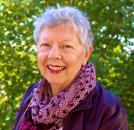McGee-Sippel poet and best-selling author is of Aboriginal Wemba Wemba, Aboriginal Yorta Yorta and Anglo Celtic background . She was separated from her Aboriginal mother shortly after birth and was adopted at six weeks of age by a non-Indigenous family. Her writing is in response to the pain she felt from not knowing her family and true cultural identity. She met her biological mother and family for the first time in 1981.
A registered nurse and midwife McGee-Sippel was caring for relinquishing mothers and those with sick, premature and stillborn babies at St Margaret's Women's Hospital, Darlinghurst, Sydney, while searching for her own mother. Following the untimely death of a much loved younger sister, in 1991, and a series of close family deaths, her words began pouring out, in the form of poetry.
Needing a career change and wanting to learn more about her cultural roots, Lorraine decided to do an Associate Diploma in Adult Education (Koori Education) 1992/3 at the University of Technology (UTS), Sydney. In 1994, she began a Bachelor of Arts in Communications, majoring in Aboriginal Studies and Writing, but the need to write her own story was strong, so in 1995 she left the University of Technology and began writing her autobiography, as well as becoming involved with Aboriginal Reconciliation, human rights and social justice issues.
McGree-Sippel was co-founder of Lane Cove Residents for Reconciliation, She has read her work at the State Library of New South Wales, the New South Wales Writers' Centre, Reconciliation meetings and various community gatherings, as well as on Koori Radio, (93.7 FM), and AWAYE (Radio National). In 2001, her manuscript/autobiography, 'The Best Part' was shorlisted for The Varuna Awards For Manuscript Development.
McGee-Sippel's story was recorded by the National Library of Australia for the Bringing Them Home Oral History Project and appeared in the associated publication Many Voices: Reflections on Experiences of Indigenous Child Separation, edited by Doreen Mellor and Anna Haebich (2002).
 7920798091534145717.png
7920798091534145717.png